From the Athens News:
AD's rationale for cutting programs meets skepticism from students
Thursday, February 8th, 2007
Ohio University administrators and students met Monday to discuss the elimination of four varsity sports, inciting both optimism and suspicion from the capacity audience.
The presentation, given by OU Director of Athletics Kirby Hocutt and a panel of three other OU administrators, was called in response to OU Student Senate's recent resolution, which condemned the elimination of the men's indoor and outdoor track and field, men's swimming and diving and women's lacrosse teams.
The resolution, passed last Wednesday, specifically cites the lack of justification and student participation in the administration's decision-making process.
While Hocutt said the decision to cut the teams is final, he did answer students' questions and even agreed, at the request of student-athletes in attendance, to consider a gradual "phase-out" plan. The proposal would allow student-athletes to finish their careers at the university.
Michaela Hahn-Lawson, president of the Student-Athlete Advisory Committee and a member of the women's swimming and diving team, said the plan suggests that the 2006-2007 freshmen would be the last athletes recruited to their eliminated teams. Once those students graduated, the teams would be cut.
Student Senate President Morgan Allen said she left the meeting with a sense of encouragement, as student voices were finally being heard.
"I don't think (the administration) actually understood how important the student input would be to the decision-making process," Allen said. "It was definitely a step in the right direction."
But some students were not completely sold. Hahn-Lawson said that she was skeptical of whether her opinions would actually be considered by the administrators.
"I've been lied to before. Who's saying their not lying again," she said, referring to the administration's promise to consider the "phase-out" plan. "The man (Hocutt) is only as good as his word. Hopefully he'll stick to it."
The meeting began with Hocutt explaining the athletic department's decision to eliminate the teams, pointing specifically to the state of the athletic program, Title IX and insufficient funds.
"The direction we have been going is transparent," Hocutt said. "We don't have enough dollars to do everything we want to do."
The state of the program, Hocutt said, is not good. "We are asking coaches to do too much with too little," he said while displaying a list of quotes from disgruntled coaches. "At national conventions," one coach's quote read, "I beg for free equipment."
Hocutt also explained how Title IX played a role in the elimination of the four teams. As part of the Educational Amendment Act of 1972, Title IX protects against gender discrimination in educational programs that receive federal financial assistance. It is commonly linked with college athletics.
Although OU currently ranks second in the nation in gender equity, Hocutt said that, due to revised NCAA standards, the university would fail its next Title IX compliancy assessment. The options, Hocutt said an outside consultant told the athletic department, were to either eliminate teams or add another women's program.
With the current athletic budget, Hocutt said adding a sport would be nearly impossible.
To conclude the administration's informational presentation, panel-member William Decatur, vice president for finance and administration, said a lack of funds also contributed to the decision to cut the teams. He explained that the athletic department's expenditures have exceeded its budget the past two fiscal years, and he expects to overspend this year by more than seven figures.
Before the cuts, Decatur said OU had the second-most varsity sports teams in the Mid-American Conference. He rationalized that OUs budget simply is not large enough to support 20 programs. With the elimination of the four sports, Decatur said OU now has the minimum number of teams to remain an NCAA Division I-A school.
Athletic department officials presented money-making opportunities for the university, such as advertising, ticket sales and private fundraising, but Decatur said that given the limited market in Athens, the opportunities don't add up to a profit.
In terms of expenses, administrators said scholarships and fellowships, payroll, benefits, and travel and entertainment fees topped the list.
Hocutt said cutting the teams will save the university $685,000. And even with those additional funds, the athletic department expects to remain in debt for some time.
Following the presentation, student-athletes and senators were given the opportunity to ask the panel questions pertaining to the decision.
Patrick Heery, academic affairs commissioner for Student Senate, said he was pleased that the administration offered such comprehensive information and is well aware of the athletic department's financial constraints.
However, Heery said he continues to oppose the lack of a student voice in the final decision to cut teams.
"I am by no means convinced that this was the proper course of action," he said. "A lot (of this) could have been avoided if students were involved" in the decision-making process.
Allen said she agreed and said Student Senate will not change its stance on the resolution condemning the athletic department. Had the department involved students from the beginning, Allen said, the final decision could have been different.
Reflecting back on the meeting, Hahn-Lawson said she was encouraged that the administrators were willing to listen to students. "They are in the position where they had to (listen to us)," she said. "They were slowly tarnishing their image."
Hahn-Lawson said Hocutt had avoided directly responding to student's questions in previous meetings, and, this time, student-athletes vowed to get their questions answered. "We didn't want him dancing around issues," she said.
Overall, the Student-Athlete Advisory Committee president said she was satisfied with students' persistence to get answers from Hocutt and other panel members.
Hahn-Lawson also said that the athletic department owes it to students to rethink the decision, as administrators don't truly realize the impact the eliminations have on the entire student-athlete community.
Hahn-Lawson explained that many student-athletes, herself included, decided to come to OU based on the existence of both men's and women's teams. She said dominant sports teams have co-ed programs in sports like swimming.
"I have four quarters left at college and (now) I'm questioning why I came to OU," she said. "I never wanted to be put in that situation."
Although Hahn-Lawson said the reinstatement of the eliminated teams would be her top choice of action by Hocutt, she admitted the "phase-out" plan seemed like a more plausible compromise.
Hahn-Lawson said she would do whatever it took for the athletic department to reconsider its decision and pleaded for her student-athlete peers. "Kirby, we don't want to leave OU," she said. "Just let us compete. We want to compete."
Friday, February 9, 2007
Subscribe to:
Post Comments (Atom)




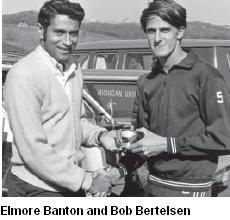

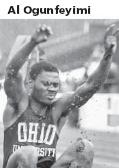


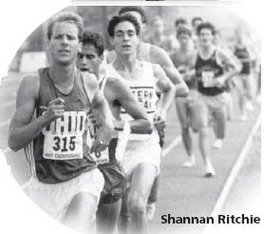

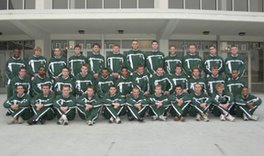


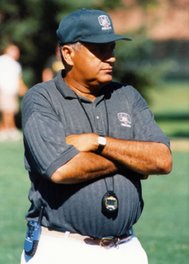




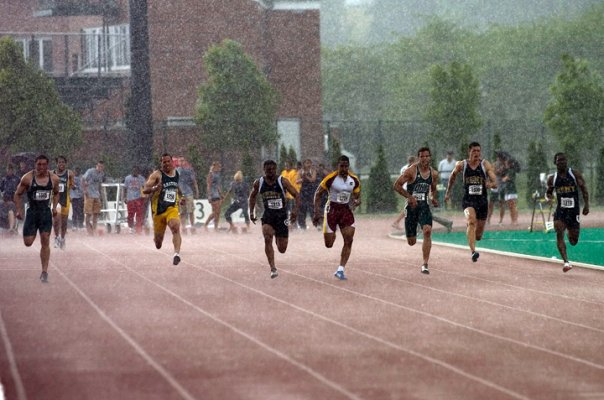
No comments:
Post a Comment